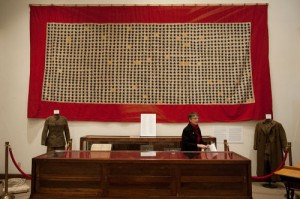May 11, 1943. A letter from Anna to Dad. She begins with a quick update on mama and daddy. Their father’s right arm is bothering him, but not “so much as to keep him from work” as a baggage handler at the train station. Mama’s been sick for an entire week since having two teeth pulled. “All last week she didn’t do much but lay in bed all day and cook herself some oatmeal.” Anna is not looking forward to the prospect of mama having more teeth pulled.
They’ve been having heavy rains in Albany and although it has been keeping them indoors, the flowers and shrubs in the yard have grown a lot. Anna’s husband Eddie has been putting in long hours at his auto repair shop since he “has no body and fender man …and the work piles up”. A typical day for Eddie now has him getting home at about ten or eleven at night.
The baby continues to grow and develop. She now weighs 19 ½ pounds and is able to stand up while holding on to the side of the crib and can sit up on her own. They bought the baby a high chair that converts into a “little cart on wheels.” Theresa-Marie enjoys riding in it and will “sit in it and yell da-da and bang the tray part in front of herself with her little hands and the bigger slapping noise her little hands make the more she slaps it.” The cart also has big red and blue beads on it that the baby likes to play with. Anna also mentions that they have a car seat that “hangs over the front seat of the car” from which that baby “can see everything that goes on.”
Anna mentions that they had a ten minute blackout the prior Friday night. She comments, “Why don’t they just win the war and then we won’t have to have these blackouts. It’s alright for people who don’t have babies…but when you have a baby it don’t know that we have a blackout and she just don’t like it. It was time for her bottle when the last one happened and we had a flashlight covered with some rags so it shone very faintly…and we kept on talking to her coaxing her to drink the milk but of not much good. When the light went on again everything was okay. She drank that milk and went to sleep.”
Anna also relates that the 10th ward (the ward the Eddie’s parents live in) “had a service flag put up on that little park just when you get off the Boulevard Viaduct and Mrs. Sullivan who lives on Orange Street …who already lost a son in the war unveiled the flag.” She writes that the ceremonies were complete with “a parade and speeches”.
For those not familiar with the tradition, during WWI and WWII it was common for families of those serving in the war to display service banners in the front windows of their homes. The small flag would have a blue star for each son in the service. If a son was lost during the war, the blue star would be replaced with a gold one. Mothers of servicemen were sometimes referred to as “blue star mothers” or “gold star mothers”. Occasionally, local communities and other organizations (churches, workplaces, etc..) displayed larger service flags with even more stars on them – one star for each member of their group in the service. In addition to rationing and blackouts, service flags were a regular reminder that the country was at war. During the Korean and Vietnam wars the practice of displaying service banners fell out of favor. Nowadays the practice seems to be extremely rare.

A Sample of a Community Service Flag. This is the WWI service flag of Boone County, Missouri. The stars represent 1534 sons of Boone County who fought in WWI. Gold stars commemorate those lost in the war. Photo credit: Columbia Tribune.
To learn more about service flags, take a look at this webpage maintained by the Blue Star Mothers of America.
Anna wraps up with a few more tidbits of hometown news including the repair work that is going on at their church. She also asks if Stanley has received the watch that she had sent for him. She concludes, “I have covered all the news and events at home. Good luck and God bless you.”

